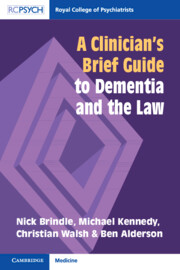Book contents
- A Clinician’s Brief Guide to Dementia and the Law
- A Clinician’s Brief Guide to Dementia and the Law
- Copyright page
- Contents
- Preface
- Common Abbreviations
- Chapter 1 Dementia
- Chapter 2 Dementia
- Chapter 3 Dementia
- Chapter 4 The Mental Capacity Act 2005
- Chapter 5 The Mental Health Act 1983
- Chapter 6 The Care Act 2014
- Chapter 7 Assessment of Capacity
- Chapter 8 The Diagnosis of Dementia
- Chapter 9 Care and Treatment Issues and the Law
- Chapter 10 Deprivation of Liberty
- Chapter 11 Discharge from Hospital
- Chapter 12 Abuse and Safeguarding
- Chapter 13 The Courts and Tribunals
- Chapter 14 The Interface between Dementia and the Criminal Justice System
- Book part
- References
- Index
Chapter 1 - Dementia
The Clinical and Diagnostic Context
Published online by Cambridge University Press: 20 July 2023
- A Clinician’s Brief Guide to Dementia and the Law
- A Clinician’s Brief Guide to Dementia and the Law
- Copyright page
- Contents
- Preface
- Common Abbreviations
- Chapter 1 Dementia
- Chapter 2 Dementia
- Chapter 3 Dementia
- Chapter 4 The Mental Capacity Act 2005
- Chapter 5 The Mental Health Act 1983
- Chapter 6 The Care Act 2014
- Chapter 7 Assessment of Capacity
- Chapter 8 The Diagnosis of Dementia
- Chapter 9 Care and Treatment Issues and the Law
- Chapter 10 Deprivation of Liberty
- Chapter 11 Discharge from Hospital
- Chapter 12 Abuse and Safeguarding
- Chapter 13 The Courts and Tribunals
- Chapter 14 The Interface between Dementia and the Criminal Justice System
- Book part
- References
- Index
Summary
The purpose of this chapter is to give a brief overview of some of the clinical features of dementia. A level of knowledge is assumed and there are other texts that comprehensively examine general aspects of dementia diagnosis, neurobiology, current interventions, etc. We will provide an overview of the range of cognitive systems and how impairments in these systems relate to the clinical presentation. While decision-making capacity and cognitive abilities are related, they are not the same thing. The first refers to the patient’s ability to make a particular decision (at a particular point in time) and the latter encompasses a broad range of processes, including a person’s memory, problem-solving, language, attention and visuospatial abilities. Understanding different cognitive domains and how they interact is necessary for accurate clinical assessment and in determining disease severity. Also, in relation to legal considerations, characterising specific deficits may also help to explain why decision-making capacity is impaired or, just as importantly, in identifying how to apply measures to support an individual’s decision-making.
Keywords
- Type
- Chapter
- Information
- Publisher: Cambridge University PressPrint publication year: 2023

